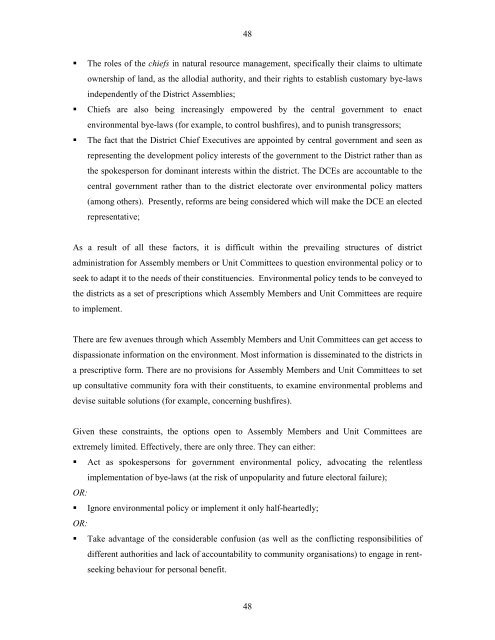Poverty Dimensions of Public Governance and Forest Management ...
Poverty Dimensions of Public Governance and Forest Management ...
Poverty Dimensions of Public Governance and Forest Management ...
You also want an ePaper? Increase the reach of your titles
YUMPU automatically turns print PDFs into web optimized ePapers that Google loves.
48<br />
! The roles <strong>of</strong> the chiefs in natural resource management, specifically their claims to ultimate<br />
ownership <strong>of</strong> l<strong>and</strong>, as the allodial authority, <strong>and</strong> their rights to establish customary bye-laws<br />
independently <strong>of</strong> the District Assemblies;<br />
! Chiefs are also being increasingly empowered by the central government to enact<br />
environmental bye-laws (for example, to control bushfires), <strong>and</strong> to punish transgressors;<br />
! The fact that the District Chief Executives are appointed by central government <strong>and</strong> seen as<br />
representing the development policy interests <strong>of</strong> the government to the District rather than as<br />
the spokesperson for dominant interests within the district. The DCEs are accountable to the<br />
central government rather than to the district electorate over environmental policy matters<br />
(among others). Presently, reforms are being considered which will make the DCE an elected<br />
representative;<br />
As a result <strong>of</strong> all these factors, it is difficult within the prevailing structures <strong>of</strong> district<br />
administration for Assembly members or Unit Committees to question environmental policy or to<br />
seek to adapt it to the needs <strong>of</strong> their constituencies. Environmental policy tends to be conveyed to<br />
the districts as a set <strong>of</strong> prescriptions which Assembly Members <strong>and</strong> Unit Committees are require<br />
to implement.<br />
There are few avenues through which Assembly Members <strong>and</strong> Unit Committees can get access to<br />
dispassionate information on the environment. Most information is disseminated to the districts in<br />
a prescriptive form. There are no provisions for Assembly Members <strong>and</strong> Unit Committees to set<br />
up consultative community fora with their constituents, to examine environmental problems <strong>and</strong><br />
devise suitable solutions (for example, concerning bushfires).<br />
Given these constraints, the options open to Assembly Members <strong>and</strong> Unit Committees are<br />
extremely limited. Effectively, there are only three. They can either:<br />
! Act as spokespersons for government environmental policy, advocating the relentless<br />
implementation <strong>of</strong> bye-laws (at the risk <strong>of</strong> unpopularity <strong>and</strong> future electoral failure);<br />
OR:<br />
! Ignore environmental policy or implement it only half-heartedly;<br />
OR:<br />
! Take advantage <strong>of</strong> the considerable confusion (as well as the conflicting responsibilities <strong>of</strong><br />
different authorities <strong>and</strong> lack <strong>of</strong> accountability to community organisations) to engage in rentseeking<br />
behaviour for personal benefit.<br />
48
















